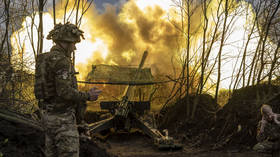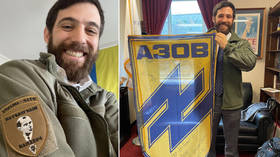Kiev could ‘capture small Russian towns’ for leverage – WaPo

The interim commander of Ukraine’s Azov Brigade (the current incarnation of a former volunteer unit known for its neo-Nazi ideology) has said that Kiev’s forces could capture Russian towns and use them to put pressure on Moscow.
In an interview with the Washington Post, Bogdan Krotevich was asked about Ukraine’s much-anticipated planned offensive against Russia.
He was referring to the experience of Chechen militants in the mid-1990s who “adopted a strategy of capturing small Russian towns to use as leverage to recover Russian-held areas” during the military conflict in the southern Russian republic. The Ukrainian fighter said his country “may do the same,” the newspaper reported on Wednesday.
It was not clear which episodes of the conflict in Chechnya Krotevich was referring to. One of the most tragic examples of violence spilling outside of the Chechen Republic at the time came in June 1995, when a militant force led by Shamil Basayev raided the city of Budyonnovsk, taking over 1,000 civilians hostage at a local hospital. Another raid targeted the city of Kizlyar in Dagestan the next year, in which Chechen militants led by terrorist Salman Raduyev likewise resorted to hostage-taking. Dozens of people were killed in both cases.
The Post’s article noted the desire of Krotevich and other Azov leaders for more prisoner exchanges between Russia and Ukraine, so captured members of the unit can be returned. Krotevich spent several months in Russian custody after he and other Azov fighters surrendered in the Donbass city of Mariupol. Krotevich was freed in a Türkiye-mediated swap last September.
“I came to the conclusion that the fastest way to release our prisoners is to take more Russian soldiers prisoner, and to end this war with our victory,” Krotevich stated.
The Post claims in its feature that the Azov battalion has “evolved” away from its neo-Nazi origins.
Moscow regards the original Azov Battalion, which was created in 2014, and its successor organizations as a terrorist group. The unit was incorporated into the Ukrainian National Guard early in its history and has now become one of the country's nine ‘Attack Guard’ volunteer brigades, revealed by the Interior Ministry, which touted service as “an opportunity to dispose of enemies” of the country.













